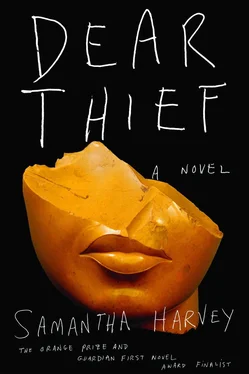They know me here; an hour or two after closing time Yannis drags the two tables together and a few of them congregate. Sometimes, once a month or so, me amongst them. When they sit together it is like the edges of the city have been drawn in, those with gold teeth and polished teeth and false teeth and missing teeth, those chased to England by Idi Amin, those who are the children of the Windrush , those who own a piece of the Berlin Wall. They come in comfortable shapeless hand-knits or beautiful suits from charity shops, except the one Nigerian who comes in beautiful suits from House of Fraser. There are always spirits and often coffee and sometimes bread. Each has fingers quick with cards; the usual is five-card-draw Poker played with a royal deck. Coppers and silvers and nothing above a pound, before midnight anyway, because no one has money to waste. It is just company and cigarettes and spirits and laughter, and an exaggerated communal love of the Queen — Poker is a royal game and she is their patron, Britannia, the matriarch it is better to love than be scorned by, the aggressor in a pair of brogues; they make affectionate attempts at mimicking her voice, which sends the ash from the tips of their cigarettes flying in gusts of laughter.
After midnight the real money comes out, small but serious sums, and then I lose interest; I still abide by the friendly pact you and I made, to play only for honour and never for money. So I sit aside with pen and paper, here by the glass display of the counter, leaning on Yannis’ copy of The Rainbow that has a receipt as a bookmark, which is still towards the beginning of chapter one.
Yannis believes my Poker skills are better than they are, perhaps because he is not used to women being able to play cards at all; I have told him about the games you and I played and explained to him that it was never in the name of skill or even fun — no, only ever in the name of jeopardy, throwing ourselves at chance and seeing who was luckier, and who the universe favoured first. Our little deals with God, I told Yannis, and he said, God does not play cards (which may or may not have been a pun, with Yannis it is hard to tell). In any case, under this misapprehension that I have any talent for the game he always positions himself with his back to me when I sit out and go to the counter, so I can see his cards and stop him if he is about to do a catastrophic thing, but I never stop him. Lately, like now, I just sit here at the counter and write to you.
Do you remember that morning when you were sitting on the windowsill at the far end of the living room, going through some old letters and photographs of your ancestors? Leaning against the wall. I think it was winter. I don’t know why but I often think of this when here with Yannis and the others. You found out that your great-grandparents had been part of a large influx of Lithuanians to Coatbridge in Scotland, at the turn of the century, all poor as birds and shipped in to work in the coalmines. Unlike the peasants who went to the New World in search of milk and honey, the letters and photographs of your ancestors did not give the impression that these Lithuanians expected anything beyond a reprieve from starvation; maybe not even that. There was only one picture of your great-grandmother, and I remember it well — do you? She is standing in a long, heavy coat in a grey street with a collection of saucepans hanging by string over one shoulder, a bundle of clothes or food in the crook of that arm, and in the other arm a baby — your grandmother — swaddled grimly. It appeared cold, she appeared cheated, but not surprised.
You looked at that photograph for a long time over a cigarette; you drank in the smoke slowly and steeply while you stared at this woman who was not really anyone. Her hard face and her scowl. The child in her arms would go on to marry one of the fortunate Lithuanians who thrived in Scotland, a Jewish man who became a doctor, so she is the one everybody starts with when they trace the family’s history, being, as she is, the good news. But my interest was in the poor broken human being who gave birth to and held her, the one who didn’t prevail, who nobody ever talked about and who probably died young in Coatbridge with bad lungs and no notion of any life that would ever yield anything but hardship and grind. You looked at the picture with a kind of fascinated contempt. You pitched your ragged beauty on our windowsill like a makeshift tent; really you never did look like somebody who was going to be there long, and I remember thinking that as I came into the room and saw you in silhouette, with your unbrushed hair tucked behind your ears. (Maybe this is the link, the thing that makes me think of you when I’m here, because Yannis and the others have this temporary look too, like they are staying and not living, even if they stay for the rest of their lives.) Behind you in the garden Nicolas and Teddy were running about in some weak Morda sun.
Your grandmother — to return to a happier theme — met your grandfather on a train to Glasgow; she going on a frugal shopping errand, he going to his last year of medical school, both immigrants, but he without any of the expectations of defeat that came with that title. They saw one another and fell in love with themselves, seeing in the other the heroic survivor they each thought they were. (Am I right in what I remember? I go over these facts sometimes in case they tell me something new about you, in the way people like to find out new things about the dead. But this memory of you on the windowsill is twenty years old and decidedly worn down.) Five, six, seven years later — your grandfather by now a specialist in lung diseases — they moved to escape the Scottish cold and ended up in the small mining community in Shropshire that is Morda, where he ran his own practice; your father was born, became interested in botany and, after the Second World War, in his early twenties, became the first in his immigrant family to go back to Lithuania, to fight for its independence from the Soviets.
This is what you told me — and that in going back he came to be involved with the Lithuanian Academy of Sciences, where he joined a project to archive seeds of indigenous plant species that were fast disappearing under Russian industrialisation. This is how he found himself face-to-face with the intimidating beauty that was your mother, who was working as a typist at the Academy. Your brother was born soon and out of wedlock, but it was another seven years before you arrived, into a now coherent and happy family in a respectable area of Vilnius; born and then, before you could know it, left as the communist grip was tightening on people like your father, and came back to Morda.
I think of the day you showed me the things of your ancestors and in that memory you are the lazy little Jewess slung in the warmth of the window, the only one of your family for generations who has had nothing material to overcome and no danger to face. You don’t even have a working religion, the Jewess is just a title that gives you licence to flirt inconsequentially with other faiths in the way a married woman can flirt inconsequentially with other men. Atrocity is going on over there, where your people are from. You just draw on your cigarette without appetite, toss the photograph onto the table and rest your head back against the wall. So I take the cigarette from your hand and sit at the opposite end of the sill, and think how strange it is, the random loins we spring from, the beauty that unfolds even from a sullen shuffling woman with clanking pans. That she left her country in 1901 and eighty-two years later it is still not free — yet that you are free, and I am free. We are free and here on the windowsill. You put your bare foot on top of mine; there are times when the very presence of another person can be a miracle. Your foot is warm, which is surprising. I suddenly remember this as I write.
Читать дальше












